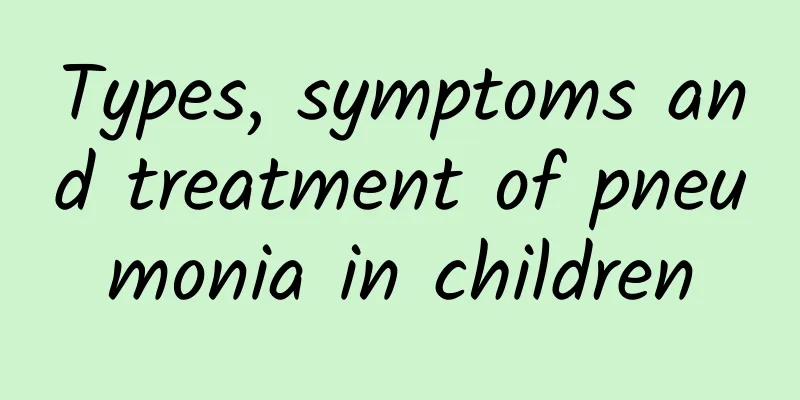Types, symptoms and treatment of pneumonia in children

|
Pediatric pneumonia is a common respiratory disease in children, and its types include viral pneumonia, bacterial pneumonia and mycoplasma pneumonia. The main symptoms include cough, high fever, and shortness of breath. Anti-infective drug treatment, symptomatic drug treatment or hospitalization supportive treatment should be selected according to the cause. 1. Common types and causes Pneumonia in children can be divided into three categories based on the cause: Viral pneumonia: caused by respiratory syncytial virus, influenza virus, parainfluenza virus, etc., and is common in children with low immunity or exposure to viral sources. Bacterial pneumonia: Usually caused by infection with Streptococcus pneumoniae, Staphylococcus aureus or Klebsiella pneumoniae. Children with low resistance after catching a cold are prone to develop bacterial infection. Mycoplasma pneumonia: caused by mycoplasma infection, common in older children, with a slow onset but a long course. 2. Symptoms and diagnosis Typical symptoms of pneumonia in children include cough, fever over 38°C, shortness of breath and wheezing. In severe cases, purple lips and general fatigue may occur. Mild patients may show symptoms similar to the common cold, while severe patients may require oxygen or hospitalization. Doctors usually make a diagnosis based on symptoms and signs, blood tests, chest X-rays and other test results. 3. Treatment methods Treatment depends on the cause and severity of pneumonia: Anti-infection treatment: Viral pneumonia is mainly treated with antiviral drugs such as oseltamivir, bacterial pneumonia requires antibiotics such as amoxicillin or cephalosporins, and mycoplasma pneumonia is often treated with macrolide drugs such as azithromycin. Symptomatic treatment: For high fever, you can take acetaminophen orally to reduce the fever. For severe cough, use expectorant and cough suppressant as prescribed by the doctor. Supportive treatment: replenish water and prevent dehydration; severe cases may require oxygen and even consider hospitalization for intravenous infusion treatment. 4. Prevention and care recommendations In terms of prevention, it is recommended to get pneumococcal and influenza vaccines to reduce the chance of infection from potential pathogens. In daily care, pay attention to keeping the indoor air circulation of children and avoid excessive exposure to polluted environments. Pay attention to maintaining a balanced diet and regular exercise to enhance immunity. Children are susceptible to pneumonia because their immune systems are not yet mature. Early detection and early treatment are very important. If you have symptoms such as difficulty breathing and persistent high fever, you need to seek medical attention immediately. Standardized treatment can effectively control the disease. Parents also need to strengthen their children's health protection. |
<<: Prevention and treatment of hand, foot and mouth disease in children
>>: How to treat hand, foot and mouth disease in children
Recommend
Can children's cough be treated with massage? What are the basic massage treatments for children's cough?
There are many massage methods for children's...
What are the causes of neonatal jaundice? Uncover the main causes of neonatal jaundice
Parents should be familiar with the causes of neo...
Why do children suffer from acute laryngitis?
Children are prone to illness when the seasons ch...
How to cure eczema in children
To completely cure childhood eczema, first of all...
Symptoms of Hirschsprung disease appear at a few months old
Hirschsprung disease usually develops symptoms wi...
Mumps is the worst day
Mumps is usually most severe on the third day, so...
What are the types of ADHD?
ADHD, also known as attention deficit hyperactivi...
What tests should be done for diarrhea in children
Children have poor resistance. In autumn, if pare...
What causes jaundice in newborn babies?
Newborn jaundice is mainly caused by bilirubin me...
What does jaundice look like?
Jaundice first causes a yellow discoloration of t...
The dangers of ADHD in children
ADHD, also known as attention deficit disorder, i...
What are the ointments for treating ADHD in children?
The treatment of ADHD in children mainly relies o...
How to distinguish influenza from the common cold Briefly describe the difference between influenza and the common cold
Unlike the common cold, which is self-limiting an...
What causes acute mumps in children?
Acute mumps in children is often caused by viral ...
The main symptom of acute laryngitis in children is dyspnea
One of the main symptoms of acute laryngitis in c...









